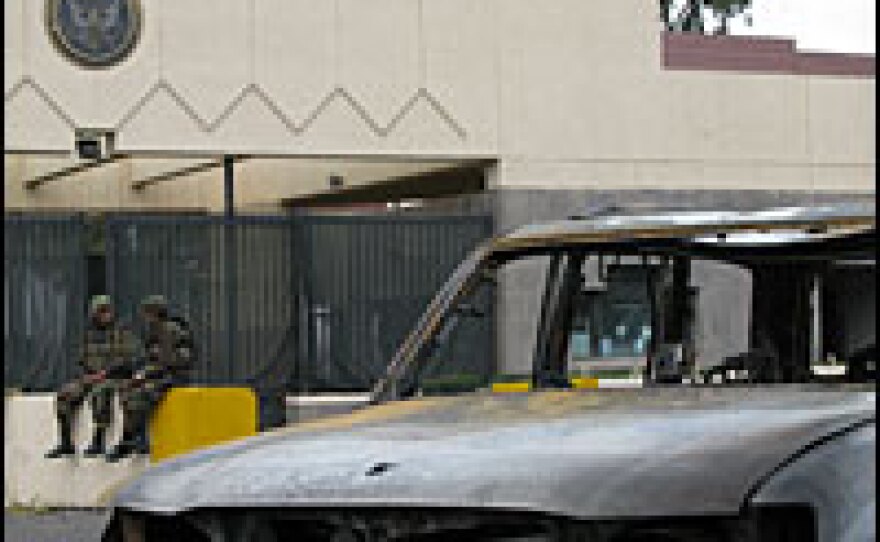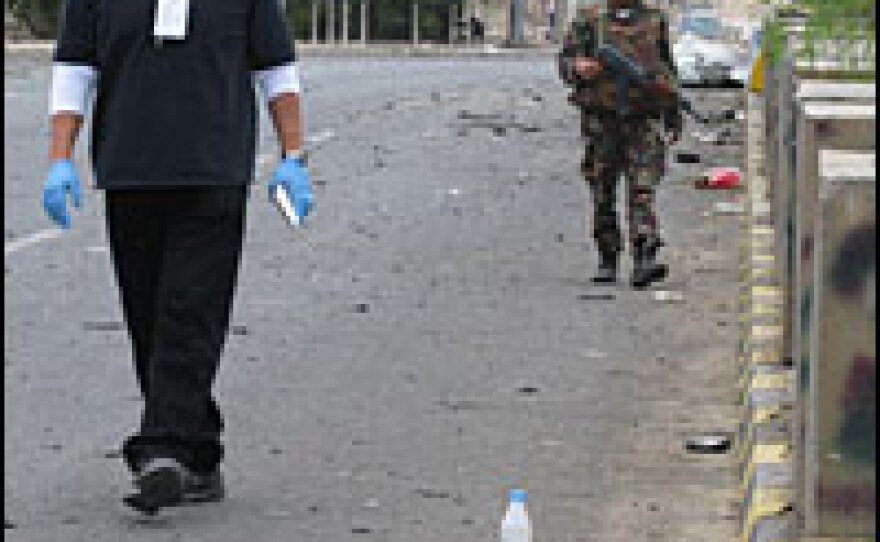

Local security forces in Yemen have detained dozens of people in the aftermath of a deadly attack Wednesday on the U.S. embassy in the capital, San'a.
Yemeni officials say 17 people were killed in what was a well-coordinated frontal assault on the fortified compound. An American high school student from New York was among those caught in the deadly crossfire.
Workers using hammers and drills began to repair the battered gate of the U.S. embassy on Thursday morning. The parking lot in front was littered with twisted metal, burned-out cars and bits of human flesh. American investigators picked through the rubble wearing rubber gloves.
About 9 a.m. Wednesday, armed attackers driving two vehicles loaded with explosives tried — and failed — to penetrate the walls of the embassy compound.
Yemeni guards and civilian bystanders bore the brunt of the attack, but among the victims was 18-year-old Susan Elbaneh of Lackawanna, N.Y., who traveled to Yemen to marry a local man last month. She was in line at the embassy applying for documents when the attackers launched their assault.
"Crazy, crazy, crazy people," says Omar Al Baradi, the owner of Azal Hotel, which is next door to the embassy. "Everybody who make this kind of fight yesterday is crazy, has no brain. For what? For what he kill people like this? If you are Muslim, you don't have [to] do that."
Wednesday's assault was the most deadly of five attacks against the U.S. embassy in the past six years. Ibrahim Atif, who lives next to the compound, remembers the last time the embassy was targeted — in March.
Atif says he helped carry wounded Yemeni schoolgirls to the hospital after someone lobbed mortars at the embassy and narrowly missed, instead hitting the girls' school next door in the middle of lunch.
The U.S. State Department says Wednesday's carefully planned assault looks like an al-Qaida-style operation.
Yemen's foreign minister, Abu Bakr al-Qirbi, agrees. He says the group that claimed responsibility for the attack, Islamic Jihad in Yemen, is linked to al-Qaida.
There have been reports that the attackers were wearing Yemeni military uniforms. "This is again not unexpected, because they can easily buy these uniforms in the market," Qirbi says.
Al-Qaida first grabbed international headlines in Yemen in 2000 when its operatives bombed the USS Cole in the port of Aden, killing 17 American sailors.
After the Sept. 11 attacks, the Yemeni government became an ally of the Bush administration in its war on terror, and Washington has since offered Yemen tens of millions of dollars to help train and equip its security forces.
But over the past two years, groups linked to al-Qaida have increased their attacks against foreign embassies, tourists and commercial interests in Yemen.
"We need really to sit and evaluate our methods of dealing with terrorism," Qirbi says.
Qirbi says Yemen needs more American help to battle al-Qaida. But, he adds, the U.S. should focus its aid more on developing the economy and educational system to achieve long-term success in the impoverished country.
"I think it's high time now that after the billions of dollars that have been spent on combating terrorism, for people to sit and ask: 'Have we achieved the objectives?'" Qirbi says. "Could we have spent that money better on different ways of combating terrorism?"
Copyright 2022 NPR. To see more, visit https://www.npr.org. 9(MDAzMjM2NDYzMDEyMzc1Njk5NjAxNzY3OQ001))







